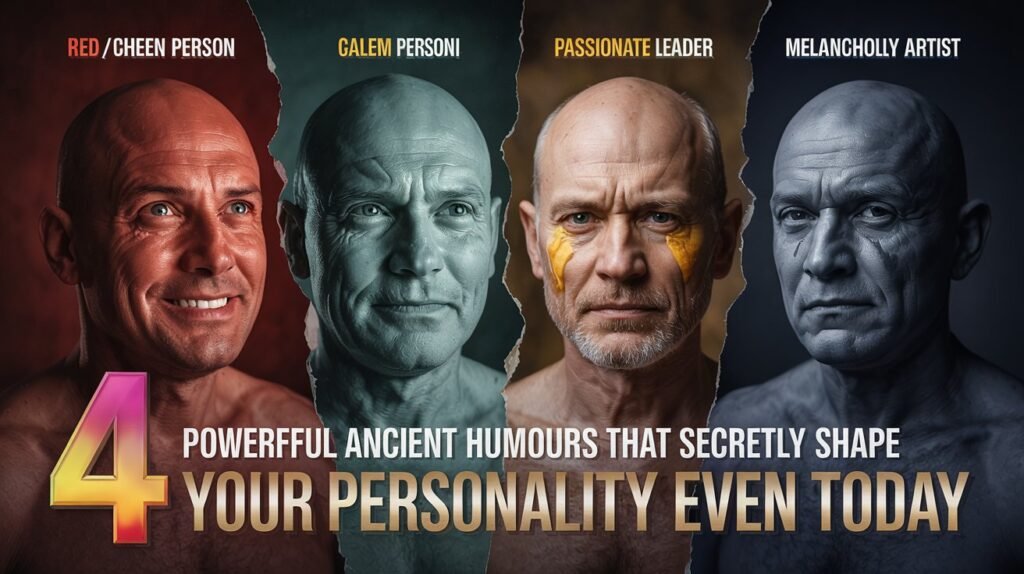Introduction
Have you ever wondered why some people are naturally cheerful while others seem perpetually serious? The answer might lie in a fascinating ancient medical theory that continues to influence our understanding of personality even today. The concept of ancient humours – dating back over 2,400 years – provides a compelling framework for understanding human temperament that still resonates in surprising ways.
Long before modern psychology, Hippocrates and later physicians developed a holistic approach to human health and personality that shaped medicine for centuries. Today, we’ll explore these four ancient humours and discover how they might be secretly influencing your life, relationships, and wellbeing.
What Are the Ancient Humours?

The ancient humours theory originated in Greek medicine, particularly through the work of Hippocrates (460-370 BCE) and later expanded by Galen. According to this fascinating theory, four bodily fluids or “humours” governed human health and temperament:
These physicians believed that perfect health resulted from a proper balance of these humours, while illness stemmed from imbalance. More interestingly, they observed that individuals tended to have natural temperaments corresponding to the dominance of particular humours.
The Sanguine Temperament: Powered by Blood
Ancient humours theory associates blood with the sanguine temperament – perhaps the life of every party you’ve attended!
The sanguine personality exudes warmth, sociability, and optimism. Linked to the element of air and qualities of heat and wetness, these individuals bring energy and enthusiasm everywhere they go.
Real-life example: Think of that friend who effortlessly lights up a room, maintains an extensive social network, and bounces back quickly from disappointments. Their natural optimism makes them resilient and charismatic, though they might sometimes struggle with following through on commitments or thinking before speaking.
Madison, a marketing executive, embodies sanguine traits in her professional life: “I thrive on brainstorming sessions and collaborative projects. My team sometimes jokes that I have enough energy for everyone! While I occasionally need to rein in my enthusiasm to focus on details, my natural ability to connect with people has been my greatest professional asset.”
When balanced, sanguine individuals are:
- Naturally charismatic and likable
- Adaptable to change
- Emotionally resilient
- Excellent networkers
The Phlegmatic Temperament: Characterized by Phlegm

The second of our ancient humours – phlegm – creates what might be the most underappreciated personality type!
Associated with water, coldness, and wetness, phlegmatic individuals bring calm thoughtfulness to every situation. These are the steady, reliable friends and colleagues who provide stability when everything seems chaotic.
Real-life example: Consider the coworker who remains unruffled during crises, methodically works through problems, and listens more than they speak. Their patience and reliability make them invaluable team members, though they might occasionally need encouragement to take initiative or express opinions.
Thomas, a software developer, reflects on his phlegmatic tendencies: “Throughout my career, I’ve been valued for my ability to remain calm under pressure and think methodically through complex problems. While my more energetic colleagues sometimes mistake my thoughtfulness for lack of passion, my steady approach has helped our team avoid countless mistakes and hasty decisions.”
When balanced, phlegmatic individuals offer:
- Exceptional listening skills
- Thoughtful decision-making
- Emotional stability
- Faithful friendship
The Choleric Temperament: Fueled by Yellow Bile
The third of our ancient humours – yellow bile – creates natural leaders and visionaries!
Corresponding to fire, heat, and dryness, choleric personalities radiate ambition, determination, and passion. These dynamic individuals drive projects forward with seemingly inexhaustible energy and clear vision.
Real-life example: This is the colleague who takes charge in ambiguous situations, sets ambitious goals, and motivates others through sheer force of will. Their decisiveness and courage inspire others, though they might sometimes need to temper their passion with patience and diplomacy.
Elena, an entrepreneur who built a successful sustainable fashion brand, shares: “I’ve always been driven to create change and lead initiatives. My ability to envision possibilities and push through obstacles has been crucial to my success, though I’ve had to learn to balance my natural intensity with patience when working with different personality types.”
When balanced, choleric individuals provide:
- Visionary leadership
- Decisive action
- Productive drive
- Courageous advocacy
The Melancholic Temperament: Influenced by Black Bile

The final of our ancient humours – black bile – creates our most profound thinkers and artists!
Aligned with earth, coldness, and dryness, melancholic personalities bring depth, sensitivity, and analytical thinking to their endeavors. These thoughtful souls notice nuances others miss and often possess remarkable creative or intellectual gifts.
Real-life example: This might be the friend who writes moving poetry, analyzes situations with uncommon insight, or maintains an unwavering commitment to perfectionism. Their attention to detail and depth of feeling enable unique contributions, though they may occasionally need help avoiding overthinking or pessimism.
James, an award-winning architect, describes his melancholic tendencies: “My sensitivity to space, proportion, and atmosphere has always informed my designs. I notice details others overlook and feel deeply connected to the environments I create. While I sometimes struggle with self-doubt, my perfectionism ultimately produces work that resonates on a deeper level.”
When balanced, melancholic individuals contribute:
- Profound analytical thinking
- Artistic sensitivity
- Attention to important details
- Empathetic understanding
Finding Your Humour Balance in Modern Life
While modern medicine has long abandoned ancient humours as a physiological theory, the psychological insights remain surprisingly relevant. Most of us contain aspects of all four temperaments, with one or two typically predominating.
Understanding your natural temperament through the lens of ancient humours can provide valuable self-awareness:
- Recognize your natural strengths: Each humour brings unique gifts and capabilities
- Identify potential imbalances: Every temperament has characteristic challenges
- Appreciate complementary types: Different temperaments provide what you might naturally lack
- Develop balance strategies: Conscious practices can help moderate extremes
Jennifer, a leadership coach, regularly incorporates humour theory in her executive development programs: “When clients understand their natural temperament tendencies, they gain powerful insights into their leadership styles. A choleric executive might learn to incorporate more phlegmatic patience, while a melancholic leader might benefit from cultivating some sanguine sociability.”
Modern Applications of Ancient Wisdom
The influence of ancient humours extends far beyond historical interest. Many contemporary personality typing systems reflect similar patterns:
- The MBTI’s four temperaments parallel aspects of the humour theory
- Modern character strength assessments often identify traits associated with specific humours
- Emotional intelligence development frequently involves balancing qualities from different temperaments
Mark, a human resources director, notes: “While we use contemporary assessment tools, I’m struck by how frequently the results align with these ancient categories. Understanding these patterns helps our team members collaborate more effectively by recognizing and valuing their different approaches.“
Conclusion: Embracing Your Unique Humour Composition
The theory of ancient humours reminds us that personality diversity isn’t just inevitable—it’s essential. A world of only sanguine enthusiasm would lack depth; all choleric drive without phlegmatic patience would quickly burn out.
By recognizing your dominant humours and appreciating those different from your own, you gain a powerful framework for self-development and improved relationships. These ancient insights continue to offer wisdom in our modern quest for balance, wellness, and self-understanding.
What’s your dominant humour? How might understanding these ancient patterns help you navigate your personal and professional life with greater awareness? The answers might just transform how you see yourself and others.
FAQ About Ancient Humours
The four ancient humours are blood (associated with the sanguine temperament), phlegm (associated with the phlegmatic temperament), yellow bile (associated with the choleric temperament), and black bile (associated with the melancholic temperament). These bodily fluids were believed to determine health and personality traits.
Ancient physicians used methods like bloodletting, dietary changes, herbal remedies, and purging to restore balance among the humours. Treatment aimed to counter excessive humours or supplement deficient ones.
No, modern medicine has replaced humoral theory with scientific understanding of physiology, pathology, and psychology. However, some traditional medical systems like Ayurveda and Traditional Chinese Medicine maintain similar conceptual frameworks about balance.
Understanding ancient humours provides a framework for recognizing personality tendencies, strengths, and challenges. This awareness can improve self-understanding, enhance relationships, and help develop more balanced approaches to life and work.
Yes, most people display a combination of humours, typically with one or two predominating. Few individuals would exhibit pure characteristics of a single humour type.
Conscious practices like mindfulness, deliberate behavior modification, and developing complementary skills can help balance extreme temperament tendencies. For example, a highly choleric person might practice patience and listening, while a strongly phlegmatic individual might benefit from occasionally taking initiative.
Other interesting content you may like
-
Neuroplasticity: 5 Steps to Rewire Your Brain for Success
-
Which Utensil is Healthiest for Eating? Complete Guide to 9 Utensils and Their Health Effects
-
18 Laws of Human Nature: Ultimate Guide to Decode People Like a Pro
-
His Holiness Beloved SP Maestro MahaaGURU Ji Invited as Special Guest for Hanuman Chalisa Meditation in London
-
1600+ Days of Continuous Yagnas and Counting: An Ongoing Mission for Global Harmony
-
Journey of His Holiness Beloved SP Maestro MahaaGURU Ji
-
Free Medical Camp Serves 150 Residents in Ramalakshmana Pally
-
What Are Mudras? 7 Sacred Hand Positions That Powerfully Transform Your Well-Being
-
7 Rules for Charisma: Proven Secrets to Become Magnetic in Any Room
-
Healing the Inner Child: 4 Powerful Trauma Types & Affirmations to Transform Your Life
Other interesting content you may like
Explore Inspiring Spiritual Websites
Aumaujaya.org
A spiritual website filled with inspiring content to help you deepen your understanding of mindfulness and living in the present. Explore their teachings to enrich your journey toward inner peace.
Visit Website →Auysa.org
A platform dedicated to motivating and uplifting the spirit of youth. If you’re looking for ways to inspire younger generations to embrace the present, this is a fantastic resource.
Visit Website →Shreeprabhu.org
A spiritual website with inspiring content centered around the idea of “Universal Oneness.” Their teachings align beautifully with the art of being present and finding happiness in every moment.
Visit Website →


